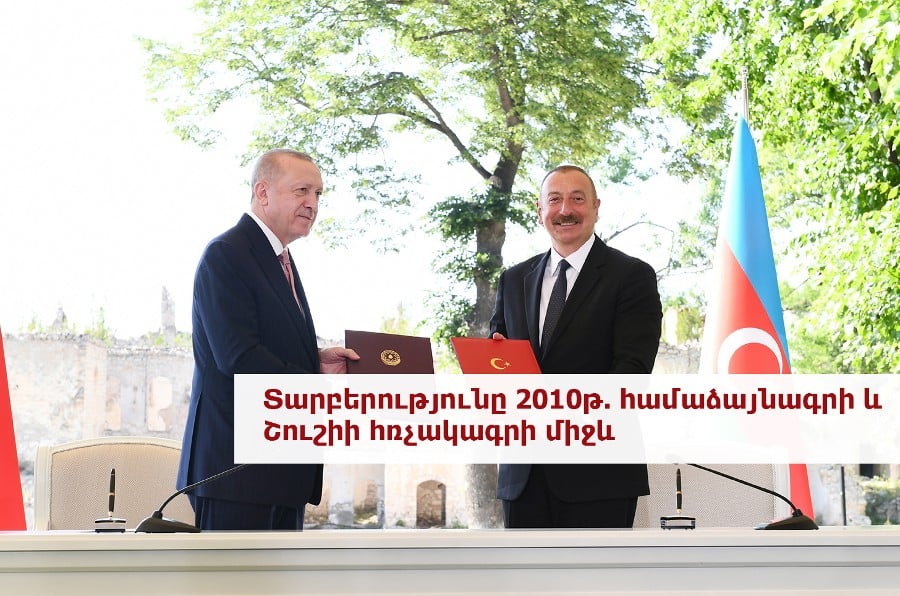
Today, on February 21, the NA Standing Committee on Foreign Relations did not accept the statement of the opposition condemning the Sհushi declaration. He substantiated the non-joining of the “Civil Contract” project with the fact that the RA Ministry of Foreign Affairs has already responded to the declaration. According to NA deputy Gurgen Arsenyan, it would be illogical if the parliament adopts a bill with the same content, as “the parliament and the Ministry of Foreign Affairs pursue and must pursue a joint foreign policy.”
Gurgen Arsenyan also mentioned that the Shushi Declaration refers to the agreement on strategic cooperation and interaction signed between Turkey and Azerbaijan in 2010, in connection with which the previous authorities did not make any condemning statements.
Maria Karapetyan also confirmed this in her speech.
Media.am fact-checked the words of the deputies and found out that the draft agreement on the Strategic Cooperation and Cooperation signed between Turkey and Azerbaijan in 2010 (watch from Armenia through VPN, as access to this platform is blocked from Armenia) was not submitted to the National Assembly. The RA Foreign Ministry did not make any statement condemning the agreement at that time. However, it is important to understand the differences between the agreement signed in 2010 and the Shushi declaration signed in 2021 and then ratified.
Strategic Partnership and Cooperation Agreement
2010 was marked by important political developments in our region: The Turkish-Azerbaijani strategic agreement was signed on August 16, and a few days later, on August 20, the Armenian-Russian protocol, which expanded the list of tasks facing the Russian military base in our country, extended its stay and made other changes.
The legal basis of the August 16 agreement is the Treaty on the Development of Friendship and Multilateral Cooperation between Kars in 1921, the Republic of Turkey and the Republic of Azerbaijan in 1994, and the Protocol on Cooperation and Mutual Assistance between the Republic of Turkey and the Republic of Azerbaijan. The new contract became a logical continuation of the previously signed documents.

The agreement has 23 articles, which are grouped into 5 sections: “Military-political and security issues,” “Military-military-technical cooperation issues,” “Economic cooperation issues,” “Humanitarian cooperation issues,” “General and final provisions.”
The issues of “Military-Political and Security” and “Military and Military-Technical Cooperation” were more important.
In the field of military-political and security issues, the parties pledged to work closely together to ensure each other’s independence, sovereignty, and territorial integrity, and to take appropriate measures in the event of danger. Mutual assistance could be in the form of emergency counseling or military assistance.
Military and military-technical cooperation included the provision of services in the field of defense, joint military exercises and defense training, training of specialists for the Armed Forces, logistics of the Armed Forces, military medical assistance.
“Declaration of Shushi”
The Shushi Declaration also highlights military cooperation, the necessary advisory and military assistance in the event of a threat or aggression from a third country, joint efforts to rebuild and modernize the armed forces, and more.
However, here, unlike the previous agreement, there are some important points that are directly related to the national interest of the Republic of Armenia. In particular, we are talking about the so-called “Zangezur Corridor.”
“The opening of a corridor (Zangezur Corridor) between the western regions of the Republic of Azerbaijan uniting Azerbaijan and Turkey and the Nakhichevan Autonomous Republic and the construction of the Nakhichevan-Kars railway as a continuation of that corridor will significantly contribute to intensifying transport and communication ties between the two countries.”
There is also a reference to the issue of the Armenian Genocide.
“Armenia’s baseless claims against Turkey, distortions of history, and attempts to politicize history by distorting facts undermine peace and stability in the region, and strongly support Turkey’s efforts to open its own archives of the 1915 events, which are aimed at opening and maintaining archives in Armenia and other countries and conduct investigations by historians on the subject.”
There is also talk of “territories liberated from Armenian occupation.”
“Based on the demining of minefields, the parties will support actions aimed at ensuring a normal life in the territories liberated from the Armenian occupation.”
It is worth noting that this declaration was signed in Shushi, which was never part of Azerbaijan, which became independent from the USSR in 1991.
Thus, the assertion of the pro-government deputies that no statement condemning the 2010 agreement was made to the National Assembly is true. However, the “Shushi Declaration,” although a continuation of the Strategic Cooperation and Cooperation Agreement, is significantly different from the content of the agreement and is much more problematic for the Armenian side.
Ophelia Simonyan


Add new comment
Comments by Media.am readers become public after moderation. We urge our readers not to leave anonymous comments. It’s always nice to know with whom one is speaking.
We do not publish comments that contain profanities, non-normative lexicon, personal attacks or threats. We do not publish comments that spread hate.